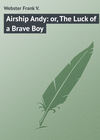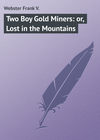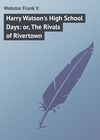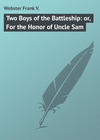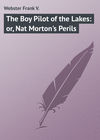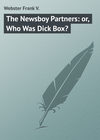Kitabı oku: «Airship Andy: or, The Luck of a Brave Boy», sayfa 4
CHAPTER X – LEARNING TO FLY
That was the first of many pleasant and interesting visits that Andy had with Mr. Morse, the inventor. By the end of the week the automobile boy had become an airship enthusiast. Andy was charmed. When he was not pottering about the Eagle or sailing the air with John Parks, he was with Mr. Morse in a congenial atmosphere of mechanics.
Although John Parks was now engrossed in using his glider, he had not given up using his dirigible balloon, and he also gave Andy some lessons in running this.
The dirigible was shaped like a fat cigar, and had under it a frame-work carrying a thirty horse-power motor and two six-foot suction wheels. When there was no wind, the dirigible could sail quite well, but in a breeze it was hard to make much progress, and to use it in a high wind was entirely out of the question.
“The monoplanes and biplanes make the old-style balloons and the dirigibles take a back seat,” said the Airship King. “But, just the same, if your motor gives out, a dirigible is a nice thing to float down in.”
“I like the dirigible,” answered Andy. “But for speed, give me the new kind of flying machines.”
Andy was in his element among the lathes, vises, saws, and general tools of the workshop. Once or twice he made practical suggestions that pleased Morse greatly. The inventor rarely left the camp, and when he did it was generally after dark. There was material and aeroplane parts to purchase. These commissions were entrusted to Andy, and he showed intelligence in his selections. Once he had to go fifty miles on the railroad to a factory to have some special devices made. He used such dispatch, and was so successful in getting just what was wanted by staying with the order till it was filled, that Mr. Morse warmly commended him to Parks.
Andy had drifted completely away from the old life. He was fast forgetting all about the Talbots and his former troubles at Princeville. One day, in a burst of satisfaction over a trial flight Andy made alone in a monoplane, John Parks declared that he would not rest until he had made Andy the junior air king of America. Then Andy felt that he had found his mission in life, and pursued his new avocation with more fervor than ever.
About all Parks thought or talked of was the coming aero meet. Andy learned that he was investing over two thousand dollars in maintaining the camp and in building the machine with which he was to compete for the prize. His success would mean something more than the winning of the five thousand dollars. It would add to the laurels already gained as the Air King in his former balloon experience, and would make him a prominent figure in the aviation field.
“Come on, Andy,” he said to his young assistant one afternoon. “We’ll stroll over to the main grounds and see what new wrinkle these ambitious fellows are getting up.”
They spent an interesting hour over in the main enclosure where prospective exhibitors were located. There was quite a crowd of visitors. Some of the aviators were explaining the make-up of their machines, and others were making try-out flights. Parks and Andy were passing to the outfield where the test ascensions were in progress, when the former suddenly left the side of his companion.
Andy was surprised to see him hasten up behind a sinister-looking man, who was apparently explaining to an old farmer about the machines. Parks seized the man rudely by the arm and faced him around squarely. The latter scowled, and then a strange, wilted expression came into his dark face.
“Excuse this gentleman, if you will,” said Parks to the farmer.
“Why, suttinly,” bobbed the ruralite. “Much obleeged to him for being so perlite in showing me ’round.”
Parks drew the shrinking man he had halted to the side of a tent.
“Now, then, Gib Duske,” he said sternly, “what were you up to with that greenhorn?”
“He told you, didn’t he?” growled the other; “showing him the sights.”
“You’re given to doing such things for nothing!” rejoined Parks sarcastically. “I recall some of your exploits in that line in the rural districts when you were with the circus.”
“See here,” broke out the other angrily, “what is it your business?”
“Just this,” retorted Parks steadily; “we’re trying to run a decent enterprise here, and such persons as you have got to give an account of themselves or vacate. What’s your game, anyhow?”
“I’m up to no game that I know of,” sullenly muttered the man called Gib Duske. “If you must know, I’ve entered my airship for the race.”
“You!” exclaimed Parks; “‘Your airship!’ Where did you get an airship?”
“I suppose I have friends to back me like anybody else when they see a show for their money. I’m an old balloonist. A syndicate, knowing my professional skill, has put up the capital to give me a try.”
“Oh, they have?” observed Parks incredulously. “I’d like to see your syndicate.”
“And I’ve got my machine,” declared Duske excitedly, “I’d have you know. I’ve heard you’re entered. Fair play, then, and I’m going to beat the field.”
Parks eyed his companion in speculative silence for a minute or two. Then he said:
“You talk about fair play. Good! You’ll get it here, if you’re square. If you’re not, you had best take my warning right now, and cut out for good. There will be no balloon slitting like there was at a certain race you were in two years ago out West. The first freak or false play you make to queer an honest go, I’ll expose you to the field.”
“I’ve got no such intentions,” mumbled Duske, with a malicious glance at his challenger.
“See you don’t, that’s all,” retorted Parks, and walked off. “You noticed that man?” he added, as he rejoined Andy, who had listened with interest to the conversation.
“Yes, particularly,” answered Andy, really able to tell his employer more than he dared.
“Whenever you run across him,” went on the Air King, “keep your eyes wide open. I’d like to know just how much truth there is in his talk about entering for the race.”
“Is he a bad man, Mr. Parks?” inquired Andy.
“He was once a confidence man,” explained the aeronaut. “When I knew him he was giving balloon ascensions at a circus. He had a hired crowd picking pockets while people were staring up into the air watching his trapeze acts. Once at a race he slyly slit the balloon of an antagonist, who was nearly killed by the fall.”
“I’ll find out just what he is doing,” exclaimed Andy.
“You can manage, for he knows me,” observed Parks.
Andy said no more. He was pretty sure from the name and description that the fellow whom his employer had just called down was the enemy that Mr. Morse had told him about. He wished he could tell Mr. Parks all that he knew and surmised, but he could not break his promise to the inventor.
“Hello, there, Ridley!” hailed Parks, as they came to where a lithe, undersized man was volubly boasting to an open-mouthed crowd about the superior merits of his machine. “Bragging again?”
“Go on, John Parks,” called the little man good-naturedly. “I’m not in your class, so what are you jumping on me for?”
“Oh, just to stir you up and keep you encouraged. I hear you’ve got a machine that will land just as steadily and balance on top of a telegraph-pole as on a prairie.”
“That’s pretty near the truth, John Parks,” declared Ridley. “I can’t make a mile in thirty seconds, but I can get to the ground on a straight dive ahead of your clumsy old Eagle, or any other racer on the field.”
“Why, Ridley,” retorted Parks, in a vaunting way, “I’ve got a boy here who can give you a handicap and double discount you.”
“Is that him?” inquired Ridley, with a stare at Andy.
“That’s him out of harness,” laughed Parks. “Like to see him do something?”
“Just to show you’re all bluster, I would,” answered Ridley.
“Machine in order?”
“True as a trivet.”
“Andy, give them a sample of a real bird diving, will you?”
“All right,” said Andy.
He had not been tutored by his skillful employer vainly. Andy was in excellent practice. He got into the clear, started up the Ridley machine, and took a shoot on a straight slant up into the air about one hundred and fifty feet.
A cry of surprise went up from the watching group as Andy suddenly let the biplane slide on a sharp angle towards the ground, shutting off the power at the same time.
Again reaching a fair height, he tipped the biplane on an angle of five degrees and came down so fast that the spectators thought something was wrong. When the machine was within a yard of the ground, Andy brought it to the horizontal with ease and made a pretty landing.
“Well, Ridley,” rallied John Parks, as the stupefied owner of the machine stared in open-mouthed wonder, “what do you say to that?”
“What do I say,” repeated Ridley. “I say, look out for your laurels, John Parks. That boy is a wonder!”
CHAPTER XI – SPYING ON THE ENEMY
“There is that man again, Mr. Parks.”
“Duske? Yes.”
“Shall I follow him?”
“I’d like to know just what he is about.”
“I would like to try and find out,” declared Andy, with more eagerness than his employer suspected.
“All right, Andy; look him up a bit. Watch out for trouble, though, for he is a dangerous man.”
It was late in the afternoon of the day succeeding Andy’s sensational performance, and Parks and his young assistant were again on the aviation field.
Andy had made out the man whom Parks had called Duske carrying two cans of gasoline past a tent. He did not seem to have observed Parks, and Andy did not believe that he knew him. Andy left the side of his employer, and, circulating around kept Duske in sight from a distance.
The boy had not said anything to Mr. Morse about Duske. He felt certain that Duske was one of the enemies the inventor had described. Just at present, however, Andy considered it would be unwise to disturb Morse. The latter had almost completed the new airship. His mind was absorbed in his task, and he was working day and night.
Duske passed the last tent on the field, and then struck off beyond some old railroad sheds to the side of an abandoned switchyard. Scattered here and there over this space were several tents. They were occupied by aero contestants who had not been able to get a favorable location on the big field, or by those who had sought this seclusion because they wished to be isolated with some fancied new invention, the details of which they did not wish their contestants to learn.
Finally Duske seemed to arrive at his destination. It was where stout canvas had been stretched about fifty feet out from the blank side of an old frame shed. These strips of canvas and the shed cut out completely a view of what was beyond. The front of this enclosure was guarded by a roof set up on posts, this leading into the entrance tent of the main enclosure.
A man about as sinister looking as Duske himself was cooking something on a stove, and two others were lounging on a bench near by. Duske carried the gasoline cans out of sight. Andy got around to the side of the enclosure, way back near its shed end.
It was getting well on toward nightfall, and he felt that he was secure in making some bold, prompt investigations. There was no doubt that the large tent enclosed the airship which Duske and his crowd intended to enter for the race. Andy attempted to lift the canvas at one or two points, but found it securely pegged to the ground.
“Humph!” he soliloquized, “everything nailed down tight. Must make their trial flights at midnight. They must think they have got a treasure in there. I’ve got to see it.”
Finally Andy came to a laced section of the canvas, which he was able to press apart a foot or more by tight tugging. He squeezed through, and stood inside the enclosure.
There was light enough to show outlines, and with a good deal of curiosity Andy walked around and inspected an aeroplane propped up on a platform in the center of the enclosure. He came to a halt at one end of the machine. Two long hollow tubes extended beyond the folding planes.
“Why,” breathed Andy, “it’s the idea they stole from Mr. Morse. Here’s the suction apparatus, and all!”
“Hi, there! who are you?”
The challenge came so sharp and sudden that Andy was taken completely off his guard. Two men had come from the front tent, their footsteps being noiseless on the soft earth floor. One of them was the man Duske.
“Just looking around,” replied Andy, edging away and pulling his cap down over his eyes.
“How did you get in here?”
“Slit in the canvas.”
“Don’t let him go – grab him,” ordered Duske’s companion quickly, and Andy began to back towards the canvas.
Duske reached out and made a grab at Andy. The latter dodged, but Duske’s hand landed on his cap. His glance falling to the inside peak, he could not help reading there the words: “Eagle– Andy Nelson.”
Nearly everything worn by Parks and Andy, as all the parts of the Eagle, were marked, so that in case of an accident identification would be easy.
“‘Eagle’!” cried Duske, bristling up. “Do you belong to the Eagle crowd?”
“He’s a spy – head him off!” shouted the other man.
“‘Eagle’– ‘Andy Nelson’,” continued Duske. “That’s your name, is it? Now then, what are you snooping around here for?”
“What’s that, what’s that?” challenged the other man quickly. “‘Andy Nelson?’ Say, Duske, that sounds familiar. I just read that name somewhere – I have it – in a newspaper – ”
“Thunder! he’s slipped us,” exclaimed Duske.
Both men had started for Andy. The latter let them come on, ducked down, dove straight between them, ran to the slitted canvas, squeezed through, and sprinted away from the spot on feet of fleetness.
“I don’t know how much I have mixed up affairs,” he reflected, as he made for the home camp. “Those fellows know my name and that I am with Mr. Parks. What bothers me most, is what the man said about seeing my name in a newspaper. Some one here – in an automobile.”
As Andy reached home he observed an automobile in front of the living quarters. A man came out as Andy stood wondering who the visitor could be. Andy noticed that he carried a small black case.
“A doctor,” he decided hastily. “Can any one be sick? What has happened?” he asked, as Scipio came out.
“Hahd luck, chile, hahd luck!” replied the cook very seriously. “Yo bettah see Mistah Parks right away.”
Andy hurried to the sitting room. Lying covered up on a couch, his right arm in splints, and looking pale and distressed, was the aeronaut.
“Oh, Mr. Parks! what is the matter?” asked Andy in alarm.
“Everything off, lad,” replied his employer, with a wince and a groan. “I’ve had a bad fall, arm broken in two places, and we can’t make the airship race.”
CHAPTER XII – TRACED DOWN
“Be careful, Mr. Parks!”
“Foh goodness sake, sah! Yo want to break dat arm ober again?”
Mr. Morse, the inventor, and Scipio, the cook, made a frantic rush for the aeronaut. They were grouped together in the center of the space occupied by their camp. The eyes of each had been fixed on an object floating about in the air over-head. All had been pleased and excited, but particularly Parks. Now as the object aloft made a skim that seemed to beat a mile a minute dash, John Parks lost all control of himself.
He forgot the fractured arm he had carried in a sling for three days, and actually tried to wave it, as he burst forth:
“Morse, you’re a genius, and that boy, Andy Nelson, is the birdman of the century!”
Andy deserved the praise fully that was being bestowed upon him. That morning Mr. Morse had completed the Racing Star, his new airship. At the present moment it was making its initial flight.
The relieved, contented face of Morse showed his satisfaction over the fact that his work was done and done well. Scipio stared goggle-eyed. As to John Parks, expert sky sailor that he was, his practiced eye in one moment had discerned the fact that the Racing Star was the latest and best thing out in aviation, and he went fairly wild over the masterly way in which Andy handled the machine.
Andy aloft, had eye, nerve and breath strained to test the splendid device to its complete capacity. He was himself amazed at the beauty the utility of the dainty creation just turned out from the workshop. What the Airship King had taught him Andy had not forgotten. After five minutes spent in exploiting every angle of skill he possessed, Andy brought the superb aeroplane down to the ground, graceful as a swan. John Parks ran up to him, chuckling with delight.
“You wonder! you daisy!” he roared, shaking Andy’s hand with his well arm.
Andy was flushed with triumph and excitement.
“If there’s any wonder to talk about,” he said, “it’s that glorious piece of work, the Racing Star, and the splendid man who made it.”
Morse smiled, a rare thing for him. Then he said modestly:
“It will do the work, handled as you manage it, Andy.”
“I feel like a caged lion, or an eagle with its wings clipped!” stormed Parks, with a glance at his bandaged arm. “Why did I go trying to show a bungling amateur how to run an old wreck of a monoplane, and get my arm broken for my pains, and lose that five-thousand-dollar prize!”
“There is time to enter a substitute, Mr. Parks,” suggested the inventor.
“Who?” demanded the aeronaut scornfully. “Some amateur who will sell me out or bungle the race, and maybe smash up my last thousand dollars?”
“Mr. Parks,” said Andy, in a quick breath, and colored up and paused suddenly. “I’d be glad to try it. Say the word, and I’ll train day and night for the race.”
“Andy, win it, and half of that five thousand dollars is yours.”
From excitement and incoherency, the little group got down to a serious discussion of the situation during the next half hour.
“It’s just one week from the race,” said Andy. “What can’t I do in learning to run the Racing Star in that time?”
“Andy, you must make it,” declared Parks energetically. “It just seems as if my heart would break if we lost this record.”
Mr. Morse got out a chart he had drawn of the run to be made on the twenty-first of the month.
“The course is very nearly a straight one,” explained Parks; “from the grounds here to Springfield, where the State fair is going on. Pace will be set by a Central Northern train, carrying assistants and repairs. The fleet will be directed by a large American flag floating from the rear of the train. It’s almost a beeline, Andy, and the Racing Star is built for speed.”
They made another ascent the next morning. Air and breeze conditions were most favorable for the try-out. Seated amidships, wearing a leather jacket, cap and gloves, Andy had the motor keyed up to its highest speed. The quick sequence of its exhaust swelled like a rapid-fire gun.
The machine rolled forward, the propellers beat the air, and the Racing Star rose on a smooth parabola. Andy attempted some volplane skits that were fairly hair-raising. He raced with real birds. He practiced with the wind checks. For half an hour he kept up a series of practice stunts of the most difficult character.
“Oh, but you’re a crack scholar, Andy Nelson,” declared the delighted Parks, as the Racing Star came to moorings again, light as a feather.
“I think myself I am getting on to most of the curves,” said Andy. “The only question is can I keep it up on a long stretch?”
“Practice makes perfect, you know,” suggested Mr. Morse.
Andy felt that he had about reached the acme of his mechanical ambition. When he went to bed that night the thought of the coming race kept him awake till midnight. When he finally went to sleep, it was to dream of aerial flights that resolved themselves into a series of the most exciting nightmares.
No developments came from Andy’s experience with the Duske crowd. Once in a while he worried some over the reference of Duske’s companions to seeing his name in the newspapers.
“Either it was about my trouble at Princeville, or some of these reporters writing up the race got my name incidentally,” decided Andy.
“Anyhow, I can’t afford to trouble about it.”
Andy rarely ventured away from the camp after dark. In fact, ever since entering the employment of Mr. Parks he had not mixed much with outsiders. He had his Princeville friends and the Duske crowd constantly in mind. But one hot evening he went forth for some ice cream for the crowd.
The distance to a town restaurant was not great. Andy hurried across the freight tracks. Just as he passed a switchman’s shanty, he fancied he heard some one utter a slight cry of surprise. Two persons dodged back out of the light of a switch lantern. Andy, however, paid little attention to the episode. He reached the restaurant, got the ice cream in a pasteboard box, and started back for the camp without any mishap or adventure.
Just as Andy crossed a patch of ground covered with high rank weeds, he became aware that somebody was following him. A swift backward glance revealed two slouching figures. They pressed forward as Andy momentarily halted.
“Now then!” spoke one of them suddenly.
Andy dodged as something was thrown towards him, but not in time to avoid a looped rope. It was handled deftly, for before he knew it his hands were bound tightly to his side.
One of the twain ran at him and tripped him up. The other twined the loose line about Andy’s ankles.
“Got him!” sounded a triumphant voice.
“Good business,” chirped his companion, and then Andy thrilled in some dismay, as he recognized his captors as Gus Talbot and Dale Billings.
“Hello, Andy Nelson,” said Gus Talbot.
Gus’s voice was sneering and offensive as he hailed the captive. His companion looked satisfied and triumphant as he stood over Andy, as if he expected their victim to applaud him for doing something particularly smart.
“See here, Gus,” observed Dale, “I’d better get, hey?”
“Right off, too,” responded Gus. “If there’s the ready cash in it, all right. If there isn’t we’ll get him on the way to Princeville ourselves some way.”
“Can you manage him alone?”
“I’ll try to,” observed Gus vauntingly, “I’ll just have a pleasant little chat with him for the sake of old times, while I sample this ice cream of his – um-um – it ought to be prime.”
Dale sped away on some mysterious errand. Gus picked up the box of ice cream that Andy had dropped and opened it. He tore off one of its pasteboard flaps, fashioned it into an impromptu spoon, and proceeded to fill his mouth with the cream.
“Don’t you get up,” he warned Andy. “If you do, I’ll knock you down again.”
“Big Injun, aren’t you!” flared out Andy, provoked and indignant – “especially where you’ve got a fellow whipsawed?”
“Betcher life,” sneered Gus maliciously. “Things worked to a charm. Got a hint from some airship fellows that you was somewhere around these diggings. Watched out for you and caught you just right, hey?”
The speaker sat down among the weeds in front of Andy. The latter noticed that his face was grimed and his hands stained with dirt. His clothes were wrinkled and disordered as if he had been sleeping in them. From what he observed, Andy decided that the son of the Princeville garage owner and his companion were on a tramp. They looked like runaways, and did not appear to be at all prosperous.
“Say,” blurted out Gus, digging down into the ice cream, as if he was hungry, “you might better have turned up that two hundred dollars for dad.”
“Why had I?” demanded Andy.
“It would have saved you a good deal of trouble. It’s a stroke of luck, running across you just as we’d spent our last dime. How will you like to go back to Princeville and face the music?”
“What music?”
“Oh, yes, you don’t know! Haven’t read the papers, I suppose? Didn’t know you was wanted?”
“Who wants me?”
“Nor that a reward was out for you?”
“Why?”
“Say, are you so innocent as all that, or just plain slick?” drawled Gus, with a crafty grin.
“I don’t know what you are talking about.”
“Farmer Jones’ barn.”
“Oh – ” Andy gave a start. He began to understand now. “What about Farmer Jones’ barn?”
“You know, I guess. It was set on fire and burned down. They have been looking everywhere for the firebug, and offer a fifty-dollar reward.”
“Is that the reason why you and Dale have left Princeville?” demanded Andy coolly.
“Eh, well, I guess not,” cried Gus. “Huh! Everybody knows how you did it out of spite against Jones because he hindered you running away from dad. Why, they found your cap right near the barn ruins.”
“Is that so?” said Andy quietly. “How did it get there?”
“How did it get there? You dropped it there, of course.”
“Purposely to get blamed for it, I suppose?” commented Andy. “That’s pretty thin, Gus Talbot, seeing that you know and your father knows that my cap was taken away from me when he locked me up at the garage, and I had no chance to get it later. You left the cap near the burned barn, Gus Talbot, and you know it.”
“Me? Rot!” ejaculated Gus, but he stopped eating the ice cream and acted restless.
“In fact,” continued Andy definitely, “I can prove that both you and Dale were sneaking about the Jones’ place a short time before the fire broke out.”
“Bosh!” mumbled Gus.
“Further than that, I can tell you word for word what passed between you two. Listen.”
Andy remembered clearly every incident of his flight from the haystack in Farmer Jones’ field. He recited graphically the appearance of Gus and Dale, and the remark he had overheard. Gus sat staring at him in an uneasy way. He acted bored, and seemed at a loss to answer.
It was more than half an hour before Dale returned. He acted glum and mad.
“Is it all right?” inquired Gus eagerly.
“Right nothing!”
“Get the money?”
“No.”
“What’s the trouble?”
“I saw a constable and told him I could give him a chance to make a fifty-dollar reward, us to get ten. He heard me through and said it wouldn’t do.”
“Why wouldn’t it?” demanded Gus.
“Because this is in another county, and he’d have to get the warrant. Said it was too much trouble to bother with it.”
“Humph! what will we do now?” muttered Gus in a disgusted way.
“That’s easy. Get Andy over the county line, and find someone else to take the job off our hands,” replied Dale Billings.
